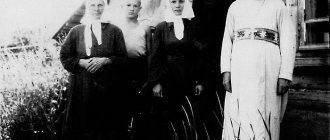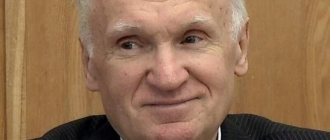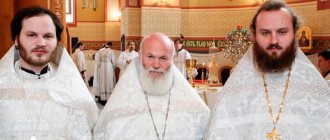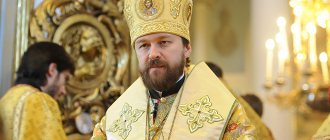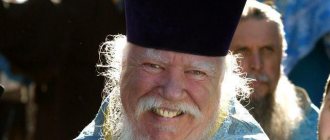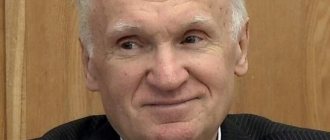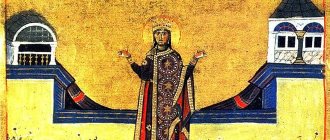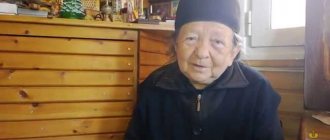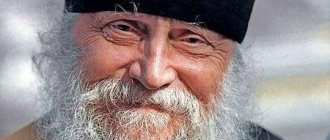Osipov Alexey Ilyich is one of the world's leading experts in the field of theology, catechist, professor, who has been teaching at the Moscow Theological Academy for many years. A publicist, a lecturer with extraordinary oratorical talent, whose sermons are distinguished by deep knowledge, accessibility of material for every listener and subtle humor.
Skillful, interesting presentation of information makes his lectures popular both among established adults and young people, for example, students who have just begun their long journey in life. The biography of Alexei Ilyich Osipov contains many events, almost all of them related to professional activities, while very little is known about the childhood, family and personal life of the eminent theologian.
It is gratifying that this modest, passionate man, who celebrated his 80th birthday in 2022, continues to work without slowing down and bring the foundations of the Orthodox faith to the masses. The man devoted his entire adult life to God and science, but, contrary to the example of most servants of the Almighty, he refused to be ordained, explaining his decision by the fact that his true calling was teaching.
Childhood
Osipov Alexey Ilyich was born on March 31, 1938 in the small town of Belev, located in the Tula region. There is little information about the family and close relatives, as well as about the early years of the future theologian; it is known that his parents were ordinary employees: his father was a military man, and his mother Olga Mikhailovna worked in a local store.
Due to the specifics of the father’s professional activity, the family was forced to change several places of residence, but in the end the Osipovs moved to the Smolensk region and settled in the city of Gzhatsk, which was later renamed Gagarin.
Alyosha Osipov in childhood with his family and father Nikon
Alexey Ilyich speaks sparingly and reluctantly about his own childhood, each time emphasizing that public confession was abolished back in the 6th century BC. Already in those distant times, people understood that a person should confess alone with a priest, so the professor says that he has nothing to say to a large audience.
When the future theologian was about seven, his mother began visiting the church, where Father Nikon (A. A. Vorobyov) was the rector. Over time, the priest had a fundamental influence on the worldview of young Alexei, and a few years later he became the guy’s spiritual mentor.
Until his death in 1963, Abbot Nikon was for Osipov an example of a virtuous Christian, a fair and competent teacher, a wise and sensitive friend. Alyosha graduated from school in 1955 in Gzhatsk. At that time the boy was very short (his growth was stunted due to a spinal injury).
Later, at his speeches, the theologian spoke about this moment and the memory that was etched in his memory associated with his mentor, Abbot Nikon. During the summer holidays, the church minister measured the boy’s height with a ruler and put a notch on the door, each time adding: “Well, look, you’ve grown up again.”
Alexey Osipov and Abbot Nikon
Father Nikon strengthened Alyosha’s faith so much that he grew up, and when the boy came to school on September 1, everyone was amazed - he became taller by as much as 15 cm. Now Alexey Ilyich explains this phenomenon by the power of his spiritual father’s conviction and has been cultivating this in himself for many years unique quality.
Growing in Faith
Having met Abbot Nikon in early childhood, Alexey Ilyich was imbued with the spirit of Orthodox piety, became accustomed to a contemplative life and grew up under the sensitive guidance of his mentor. The elder immediately drew attention to the inquisitive and diligent boy and taught him a lot. He gave Alyosha reading Russian classics, Greek philosophers and, of course, the holy fathers of the Orthodox Church - John Climacus and the collection “Philokalia”.
The elder also monitored the boy’s studies, his grades and his leisure time. He taught him, for example, how to play chess, but then, when Alexey Ilyich had already grown up, he forbade him from playing chess, saying that it was a pointless waste of time. To the young man’s perplexed questions, the elder answered that in adolescence, chess is a lesser evil compared to other nonsense that can swarm in a teenager’s head.
Youth years
When Alyosha Osipov reached the age of joining the Komsomol, the young man unequivocally refused to become a member of this organization. The young man did not voice the reasons for his action, but most likely they lie in the religious beliefs instilled in Alyosha by his mother and spiritual mentor.
After graduating from school, the future professor of theology had a question about where to go to study next. The administration and teachers of the school suggested that the gifted boy apply to the university, but his spiritual father advised Osipov to choose a different path.
Over the next three years, the aspiring theologian, under the guidance of his constant mentor, prepared to enter the Moscow Theological Seminary. The main emphasis in preparation was on studying descriptions of the lives of the holy fathers and interpretation of the foundations of the Christian faith.
A. I. Osipov at one of the conferences dedicated to ecumenism
Armed with the mentor’s recommendations and successfully passing all the preliminary interviews, Alexey Osipov was immediately enrolled in the 4th grade graduation class of the institution, which the young man graduated with flying colors the following year.
As Alexey Ilyich later said, even the seminary teachers could not provide students with such profound knowledge in theology, which he received from his mentor. Then Alexey Osipov enters the Moscow Theological Academy and also successfully graduates in 1963, writes a dissertation, receives a PhD in theology and is sent to work in one of the Smolensk churches.
He did not work in his new place for long. Almost immediately, at the invitation of a higher educational institution of the Russian Orthodox Church (Russian Orthodox Church), the young man goes to graduate school for further studies.
Certain theological views
- Discussing the image of God, Osipov points out its significant difference for different religions, since in this case this idea is characteristic of a given religion, and it is not the One invisible God that everyone talks and thinks about.
- Alexey Ilyich, touching on issues relating to spiritual mentors and prophets , warns believers against blindly following their guidelines, urging them not to recklessly accept them on faith without consideration and testing.
- Speaking about environmental problems , the professor argues that they relate, first of all, to the spiritual sphere of man , since the state of the environment directly depends on the actions of people in relation to nature.
- The theologian, noting the growing trend of indifference among Orthodox believers to moral and dogmatic teaching, expresses fears about the transformation of the Church into a community of people moving away from the truth. It is in the correct understanding of the foundations of the Orthodox faith and the spiritual enlightenment of the people that the professor sees the source of its preservation.
- Alexey Ilyich, speaking about prayer, claims that if a person does not have prayer inside, and he does not pray with either his mind or soul, then his “religiosity” is imaginary and empty .
Alexey Ilyich Osipov
Mature age
In 1964, at the age of 26, Alexey Osipov, after completing a course at the academy, completed his postgraduate studies.
Teaching
After completing the course, the young man receives an invitation to work at the academy and remains to teach the basics of theology and the new discipline of ecumenism (pan-Christian cohesion) at that time. While engaged in teaching, at the same time Alexey Ilyich lectures on the basics of theology, the Christian faith and Western religions in the 1st year at the academy and in the 5th year at the seminary.
A.I. Osipov spent almost his entire life teaching.
In 1969, the young scientist became an associate professor, and in 1975 he received the title of professor at the Theological Academy. Since 1990, for three years he has been working at the academy as the editor-in-chief of the printed publication “Theological Bulletin”.
Work in the Russian Orthodox Church
In 1964, Alexei Osipov received the position of secretary of the Russian Orthodox Church commission, which was preparing materials for the compilation of a religious and ethical encyclopedia, the publishing of which was planned to be carried out in Athens. From 1973 to this day, the professor has been one of the most active employees of the Russian Orthodox Church. Alexey Ilyich was a member of:
- educational committee at the Holy Synod until 1986;
- Jubilee Local Council in 1988;
- coordinating committee for interaction between the RF Armed Forces and the Russian Orthodox Church from 1994 to 1995;
- permanent Presidium of the World Russian Councils of several convocations from 1995 to 1997;
- Synodal working group to create the foundations of the concept of the Russian Orthodox Church;
and also participated in dialogues between the Russian Orthodox Church and other religious denominations.
A.I. Osipov is happy to share his accumulated knowledge with both ordinary people and church ministers
However, it is worth noting that at present the attitude of the Russian Orthodox Church to the worldview and lecture material of Professor Osipov varies. In the field of apologetics (basics of theology), Alexey Ilyich is clearly recognized as the greatest specialist.
But regarding Dogmatic Theology, his judgments are subject to doubt. According to the verdict of the Synodal Commission, Alexei Ilyich’s lectures go beyond the scope of Orthodox dogma, based on the revelation of God.
Social and political activities
- A. I. Osipov is actively immersed in the events of the public and political life of his native country:
- From 1967 to 1987 and from 1995 to 2005, the professor was a member of the editorial board of the collection “Theological Works.”
- From 1991 to 2016, he was co-chairman (from religion) of the international confession “Science. Philosophy. Religion".
- Participated in assemblies of the World Council of Churches, conferences of European churches and the Christian Peace Conference.
- He was present as an honored guest at world church and public conferences and assemblies in Russia and abroad.
- He gave lectures on television, at meetings of believers, as well as at meetings with students of theological seminaries and academies.
In addition, Professor Osipov is regularly invited to give his most interesting and instructive lectures, and is asked many questions, which he is happy to answer in detail. His speeches are regularly broadcast on the Orthodox TV channel Soyuz.
In addition, Alexey Ilyich is productively engaged in journalism. The professor's works are regularly published in Russian publications (Theological Works, Journal of the Moscow Patriarchate) and foreign media.
Professor Osipov is a regular participant in various church conferences and denominations
Content
- 1 education
- 2 church positions
- 3 ecumenism 3.1 Orthodox-Lutheran dialogue
- 9.1 pathological speech theorist
Personal life
Like all popular and public people, in addition to their professional and creative activities, their personal life is of great interest. World-famous professor of theology A.I. Osipov was no exception. For decades, spectators and listeners of lectures have been concerned about the scientist’s marital status: does he have a wife and children?
But Alexey Ilyich never talks about his private life, believing that it is not a matter of public knowledge. The professor is modest and does not try to attract attention to his person with anything other than his own works.
Education
Classes with Father Nikon and his serious recommendations helped Alexei Ilyich immediately enter the fourth year of theological seminary, having passed exams for the first three. The elder looked after Alexei Ilyich until the very end of his life and was his main support in his spiritual maturation. In the last year of his life, Father Nikon was seriously ill, but, maintaining a clear mind and a pure heart, he never ceased to be a bright beacon in the biography of Alexei Ilyich Osipov.
Interesting Facts
The works of Alexey Osipov are highly appreciated by the Russian Orthodox Church, for which the professor of theology has multiple awards from the Russian Orthodox Church: the Order of St. Sergius of Raddonezh Ι-ΙΙΙ degrees, the Order of St. Macarius, Metropolitan of Moscow and All Rus' Ι-ΙΙΙ degrees, etc.
A.I. Osipov maintains his own official website https://alexey-osipov.ru/, where almost all of his lectures are posted in the public domain. Therefore, those who wish can familiarize themselves with them freely. In addition, on the portal you can ask the professor any question related to religion, and the theologian will answer it in detail.
events
- Interview between representatives of the Union of Evangelical Churches in the GDR and the Russian Orthodox Church (July 8, 1974)
- Fourth theological interview between representatives of the Roman Catholic Church and the Moscow Patriarchate (June 24, 1975)
- Arnoldshain-VII (25 May 1976)
- Theology of the Church and its Application (Congress) (August 19, 1976)
- III interview with Pax Christi (6 May 1978)
- Consultation of representatives of the Churches of the USSR and the USA on the topic “Responsibility of the Churches of the USSR and USA for disarmament” (March 27, 1979)
- V theological interview with representatives of the Roman Catholic Church (April 25, 1979)
- World Conference on Faith, Science and the Future (July 12, 1979)
- II meeting of the Inter-Orthodox Commission on theological Orthodox-Lutheran dialogue (September 17, 1979)
- VIII General Assembly of the CEC (October 18, 1979)
- Theological consultation of representatives of Pax Christi and the Russian Orthodox Church (March 19, 1980)
- IV interview of the delegation of the Russian Orthodox Church with the Pax Christi delegation (October 2, 1980)
- Religious Leaders for Saving the Sacred Gift of Life from Nuclear Disaster (Conference) (May 10, 1982)
- Second meeting of the Mixed Theological Commission on Orthodox-Lutheran Dialogue (May 23, 1983)
- VI General Assembly of the WCC (24 July 1983)
- Third meeting of the Mixed Theological Commission on Orthodox-Lutheran Dialogue (May 29, 1985)
- Sinappi-VII (3 June 1986)
- IX General Assembly of the CEC (September 4, 1986)
- Arnoldshain-XI (27 April 1987)
- Fourth meeting of the Mixed Theological Commission on Orthodox-Lutheran Dialogue (June 3, 1987)
- V Seminar of Orthodox theologians and biblical scholars (October 26, 1988)
- Fifth meeting of the Mixed Theological Commission on Orthodox-Lutheran Dialogue (September 7, 1989)
- VIII interview of the delegation of the Russian Orthodox Church with the Pax Christi delegation (March 9, 1990)
- Arnoldshain-XII (20 April 1990)
- VII General Assembly of the WCC (February 7, 1991)
- Slavic world - unity and diversity (conference) (May 26, 1993)
- Unity of the Church (conference) (November 15, 1994)
- II World Russian Council (February 1, 1995)
- Orthodox theology on the threshold of the third millennium (conference) (February 7, 2000)
- Church teaching about man (conference) (November 5, 2001)
- V meeting of the joint commission on dialogue “Orthodoxy-Islam” (February 27, 2006)
- Thirteenth meeting of the Mixed Theological Commission on Orthodox-Lutheran Dialogue (November 2, 2007)
- Awarded November 15, 2022 (November 15, 2017)
- XI meeting of the joint commission on dialogue “Orthodoxy-Islam” (May 5, 2018)
pathological speech
Master of pathological speech, pathological speech theorist, one of the creators of worldological and ecumenical jargon.
Very good command of word-motor speech techniques. Texts by A.I. Osipov's works are very poor and inexpressive in language, ugly in composition, and in themselves cannot explain his wide popularity among Orthodox Christians. At the same time, the speech of A.I. Osipova is bewitchingly “sweet” due to her skillful command of linguistic and manual gestures, rhythm, and intonation.
pathological speech theorist
Words are insufficient
Despite the ongoing very intensive development of human thinking, the language of modern man, as before, cannot adequately express not only feelings, sensations and experiences, but very often he lacks unambiguous, precise concepts for expressing ideas and thoughts. The ambiguity of concepts and terms is one of the significant obstacles to interhuman communication and mutual understanding. This obstacle is felt with all its force in the scientific and theological sphere, especially in our ecumenical age[4].
swear words
school theology
- Berdyaev was not far (in this case) from the truth when he wrote: “Russian school theology, scholastic in spirit, in essence was not ... Orthodox, did not express the religious experience of the Orthodox East”[5].
theory
- The image of Christ was for them (newly converted ancient Russian people. - Ed.) not an abstraction, but a tangibly experienced reality. The ideals of Christianity were not an abstract theory for them, but were vividly embodied in specific people who made up the council of Russian saints[6].
- The patristic works were studied (in Orthodox monasteries - Ed.) not for the sake of theoretical
theological knowledge (knowledge for the sake of knowledge)[5].
legalism
- Two completely different understandings of prayer and attitudes towards it. One is external, ritual, or, if we use the language of the Gospel, legalistic
, the other is sincere, sacrificial, repentant[7]. - Both the absurdity of a purely rational and ritualistic, legalistic
faith, which grows complacency and pride in a person, and the true dignity of true humility become obvious[8].
forbidden words
A.I. Osipov categorically rejects the term “transubstantiation” as a Roman Catholic error, denying the change in the essence of bread and wine into the essence of the Body and Blood of Christ[9].
techniques
Gnostic art of reading
A.I. Osipov offers his interpretation of the works of St. Ignatius (Brianchaninov) in the spirit of the Gnostic art of reading.
biblical allusions
- For Christian consciousness, all nations represent a single fraternal union, not only by virtue of “one blood,” but also by the power of the One Christ, who sacrificed Himself for all humanity and calling every person to salvation[10]:34.
I hear from the same one
- The Sysoev Club could easily be accused of heresy[11].
As is known (pathological speech technique)
- For, according to many wise mentors, in marriage, compared to monasticism, there are even more favorable conditions for knowing oneself, one’s selfishness, pride, and self-love[12].
aphorisms
Orthodoxy is shown, but not proven
slogans
Conquer the hateful strife of this world
- Trinitarian Love is an ideal intra-divine Peace (2 Cor. 13:11), contemplating which with the eyes of faith and experiencing it in the experience of spiritual life, Christians acquire the power to overcome the hateful discord of this world, establishing peace and good will in it (Luke 2:14) [10]:33.
- It is not for nothing that there is an expression, an expression that says a lot - it was about the Trinity-Sergius Lavra and the words are: “So that people, looking at the icon of the Holy Trinity, learn to overcome the hated discord of this world
.” Just think, humanity has many hypostases, right? Each face is a face... Here, we are all here: we are all one by nature - we are all people, but we are not one, not at all one, in our essence. What is the reason? Sin separates man from man...[13].
stamps
understanding
The ambiguity of concepts and terms is one of the significant obstacles to interhuman communication and mutual understanding. This obstacle is felt with all its force in the scientific and theological sphere, especially in our ecumenical age[4].
Truth is not what, but who
- Truth is not a what, but a Who[14].
Subconscious
- Not a single impression of the external world or internal experiences disappears from our soul, for a person is a “computer” with an endless memory in which absolutely everything is stored in the subconscious
[15]. - The use of these terms (“mysticism” and “mystical experience.” - Ed.) ... very effectively introduces into the subconscious
and consciousness the destructive idea of the essentially identical ascetic paths of all religions[16].
Non-fusion and inseparability
In the Christian understanding, the world appears... inseparably and inseparably united with its Creator, since it is the “realization” of His eternal, uncreated energies...
The “Chalcedonian” principle of the unfused, unchanging, inseparable, inseparable unity of God with the world runs through the entire history of the world and is realized in it on three different levels. The first is the creation of the world, where unity with God according to the “Chalcedonian” principle is at the level of the world’s participation in the energies of God, but not His essence. The second is the Incarnation, where, according to the same principle, the union of the divine and human natures takes place in Jesus Christ. The third is the general resurrection... when the unity of God with all humanity and all creation will reach its utmost degree, but without confusion or dissolution, that is, according to the same “Chalcedonian” principle[17]:117.
Not given, but given
- This beauty, given and assigned to man in creation, is revealed, however, only through correct life, called asceticism[18].
pathological vocabulary
Absolutized, Abstraction, Automatic, Automatically, Authoritarianism, Anthropomorphic, Lifeless, Ugly, Biorobot, God, God-humanity, Morbidity, Morbid, Illness, Letter, Bourgeois, In Conditions, Milestone, Mutual Enrichment, Relationship, Mutual Support, Mutual Understanding, Interconnected, Mutual Salvation, Guilt , Influence, Externally, Externally, Retribution, Possibility, Universal, All-Forgiveness, Comprehensive, All-Human, Challenge, Ransom, Major, Horizontal, Rough, Humanism, Dogma, Dignity, Pre-Christian, Thinking, Consubstantial, Naturally, Alive, Life on earth, Legalistic , Legalism, Western, Programmed, Program, Merit, Thought Provoking, Heterodox, Sincerely Erroneous, Ultimate Truth, Healing, Judeo-Pagan, Judeo-Paganism, Collective Mind, Colossal, Confessionalism, Rooted, False Liberal, Love, Maximum, Interreligious , Interchristian, Meonism, Meonistic, Meonicity, Dead, Deadening, Mechanically, Mechanical, Mechanicality, Moral, Powerful, External, Irreducible, Non-fusion and inseparability, Nestorian, New generation, Experienced, Insult to God, Abstract, Revelation, Detachment, Pedagogical, Experience , According to many, Subconscious, Political, Understanding, Truth, Legal, Justice, Just, Transformation, Transubstantiation, Progressive, Epiphany, Slave-mercenary, Joy, Joy of life, Developing countries, Development, Rational, Rationalism, Rational, Revolutionary, Self by itself, Autocracy, Self-determination, Self-knowledge, Self-understanding, Freely choose, Free choice, A kind of, Synergism, Situation, Difficult, Consent of the Fathers, State, Cooperation, Justice, Become, Judgment, Judge, Scholastic, Scholastic, Theoretically, Theoretical, Theory , Satisfaction, Narrow, Bonds, Propitiation, Convention, Aspiration, Teaching, Economic activity, Central, School theology, Evolutionary, Ecological, Ecology, Legally, Language
